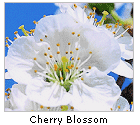home > about us > our commitment
Our Commitment
From Our Tree to Your table
page 1 2 3 4
When you buy from us you benefit from a strong commitment that goes far beyond a pleasant voice on the telephone or a slick four-color catalog. As growers we are stewards of the land and active in our rural community. Our investment begins long before a label is put on a product or an order is processed. We are tart cherry growers with over 100 acres of Montmorency trees, and a lifetime of experience and dedication to the future of tart cherries.
In today's overwhelmingly urban, technological world, many people do not know how a farm product gets to the table, or have only a vague idea where the food they eat comes from or how it is produced. Farming today requires not only agricultural skills, it also represents substantial financial investment and ongoing education in new safer and more productive techniques.
How Cherries are Grown
 We will start with the most basic fact: cherries grow on trees. These trees need to be planted, managed and brought to maturity in good health to bear cherries. Cherry trees grow best in sandy soil because it drains well. The Grand Traverse Bay area of northern Michigan features rolling, sandy soil that is ideal for tart cherry trees, and this is one of the reasons that so many tart cherries are grown here. We also benefit here in Antrim county from the moderating effects of the bay and Lake Michigan, which reduces the risk of frost damage to buds and blossoms in the spring. We will start with the most basic fact: cherries grow on trees. These trees need to be planted, managed and brought to maturity in good health to bear cherries. Cherry trees grow best in sandy soil because it drains well. The Grand Traverse Bay area of northern Michigan features rolling, sandy soil that is ideal for tart cherry trees, and this is one of the reasons that so many tart cherries are grown here. We also benefit here in Antrim county from the moderating effects of the bay and Lake Michigan, which reduces the risk of frost damage to buds and blossoms in the spring.
The Bloom
 In the spring, cherry trees have white flowers, called blossoms. Blossom time is critical in the life cycle of the tree and without a good bloom, the crop will not be good. Pollination of the blossoms is needed, and that is dependent on the activities of bees and is effected by a variety of factors, especially temperature. In 2002, hard frosts in May were a big part of the reason the cherry crop failed, as the buds and blossoms were damaged by the freezing temperatures. Even the blossoms that did survive were not well pollinated, however, as bees are not active when the temperatures stay low. In the spring, cherry trees have white flowers, called blossoms. Blossom time is critical in the life cycle of the tree and without a good bloom, the crop will not be good. Pollination of the blossoms is needed, and that is dependent on the activities of bees and is effected by a variety of factors, especially temperature. In 2002, hard frosts in May were a big part of the reason the cherry crop failed, as the buds and blossoms were damaged by the freezing temperatures. Even the blossoms that did survive were not well pollinated, however, as bees are not active when the temperatures stay low.
When all goes well, the blossoms are pollinated and we have a chance for a good fruit-set and a profitable crop. After the blossoms fall off the trees, tiny green cherries start to grow where the blossoms once were. Over the next two months, the cherries will grow in size and gradually turn bright red. We monitor the sugar content of the fruit as an indication of ripeness, and watch for the optimum time to harvest for best flavor and size.
Next > Harvesting Tart Cherries
When is a Farm not a Farm?
It seems like everyone wants to call themselves a "farm" these days. Apparently, corporate marketers think that we will buy more packaged and processed food if the illusion is created that it is more closely connected to farming then is often actually the case. Television ads show actors pretending to be farmers skipping through cornfields while an announcer solemnly narrates with a string of buzz words about "old-fashioned values" and "small town folks" and how important the "earth's bounty" is to them.
|





